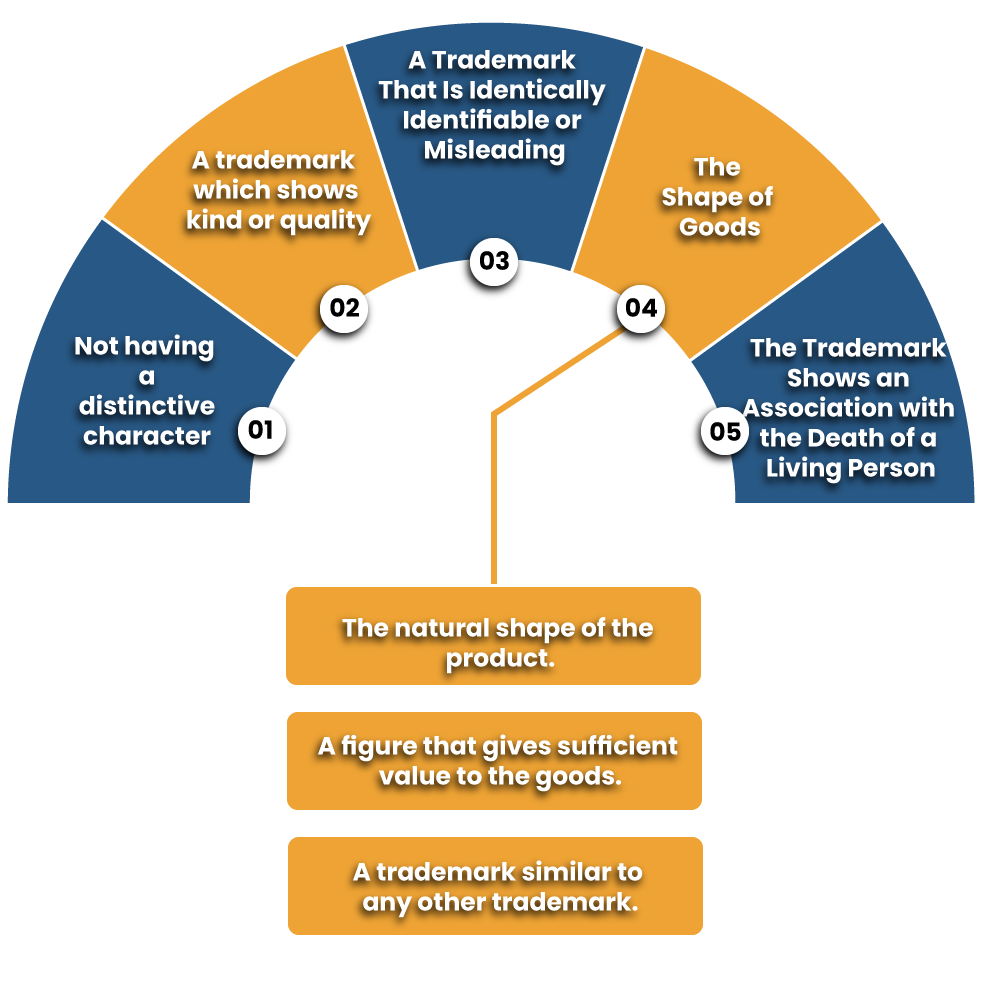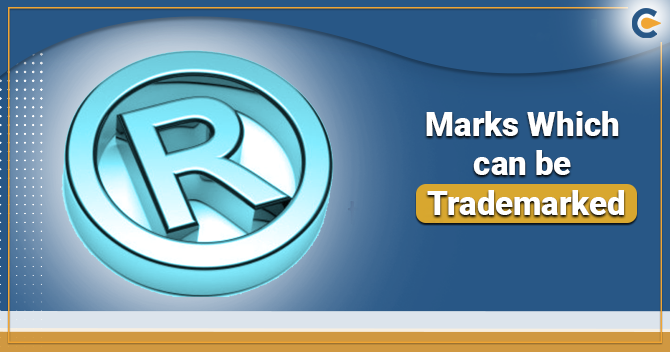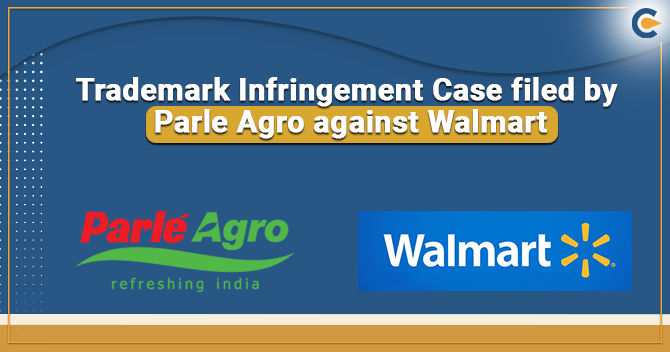Trademarks in India are registered under the Trademark Act, 1999. An application is filed with the Registrar of Trademarks for registration. The registrar may accept the application and proceed to register the trademark. If he finds any mistake in it, he can also reject the application. The Act also discusses a list of trademarks that cannot be registered under trademark law.
Types of the Trademark that Cannot be registered under Trademark Law
As per the trademark law, the below mentioned are the types of the trademark that cannot be registered.


Not having a Distinctive Character
It counts the trademark that does not have a specific character that can distinguish goods or services from others. This means a brand name that is already registered or is applicable for registration cannot be trademarked under trademark law. This can cause a dilemma among consumers. For instance, no brand can be registered with “TATAA” because it is similar to a registered brand “TATA”.
A Trademark which shows Kind or Quality
A brand name that exists of the word generally used in day-to-day life to identify the product cannot be trademarked under trademark law. It may evolve kind, quality, quantity, values, geographical origin, along with its characteristics. Following are some examples that cannot be trademarked.
- Perfect Arcs– It exhibits the quality of perfection.
- 10 Liter bottles– It exhibit quantity.
- Assam– It exhibits the geographical basis.
- Mobile– It is an ordinary word to recognize mobile phones in day to day life.
Read our article:Overview on Cost of Trademark Registration
Identically Identifiable or Misleading as Other Registered Trademarks
The trademark is prohibited under trademark law, when;
- It refers to a nature that deceives the public.
- In any word or case, the religious sentiments of any section of India’s citizens are likely to be hurt.
- Includes scandalous or obscene content.
- Forbidden under the Emblems and Names (Prevention of Improper Use) Act.
- It contains malicious or vulgar content.
- Prohibited under the Emblem and Names (Prevention of Improper Use) Act.
The Shape of Goods in the below-mentioned Conditions
Trademarks can be registered for goods of specific size under trademark law. For example the size of a Coca-Cola bottle. But the following types of goods cannot be trademarked.
- The natural shape of the product.
- A figure that gives sufficient value to the goods.
- A trademark similar to any other trademark having a different goods and service description will not be registered if the registered trademark is a well-known trademark in India and the use of the brand will provide undue advantage to the applicable trademark.
Shows an Association with the Death of a Living Person
If the trademark shows a relationship with a living person or a person who has died 20 years prior to the date of an application, such application will not be registered unless one from such survivor The NOC is not received or the NOC becomes a dead person.
If a registrar can fit in, the registrar may register or reject the trademark subject to any amendments, conditions, or limitations.
What are the Grounds of Refusal of any Trademark Application?
Section 9 of the Act deals with Absolute Ground whereas Section 11 of the Act deals with the Relative Ground. Both sections provide certain grounds for a registration trademark to be refused.
Absolute Grounds for Refusal of Registration under Trademark Law
Section 9 of the Act lists the absolute grounds for denial of registration. If a trademark falls under the Aadhaar listed in this section, it cannot be registered. Absolute grounds for refusal of registration are given below:-
- Trademarks that have no specific character. Specific character means trademarks that are not capable of distinguishing one person’s goods or services from another.
- Trademarks that specifically contain markings or signs that serve to define the type, quality, quantity, intended purpose, prices, or geographic origin goods or services provided in the trade.
- Trademarks that specifically contain markings or signs that have become customary in current language or established practices of trade.
- Trademarks are of a nature that deceives the public or creates confusion.
- Trademarks which are likely to injure or involve the religious sensibilities of any class or classes of citizens of India.
- Trademarks that specifically contain markings or signs that have become customary in current language or established practices of trade.
- Trademarks are of a nature that deceives the public or creates confusion.
- Trademarks which are likely to injure or involve the religious sensibilities of any class or classes of citizens of India.
- Trademarks that contain or contain scams or obscene cases.
- If the use of the trademark is prohibited under the Emblems and Names (Prevention of Improper Use) Act, 1950.
- Trademarks containing the markings of the shape of the goods originating from the nature of the goods.
- Trademarks that contain traces of the size of goods that are required to achieve a technical result.
- Trademarks with markings that give sufficient value to the goods.
Relative Grounds for Refusal of Registration
Section 11 of the Act provides relative grounds for denial of registration. This section provides an exception based on denial. If exceptions are complied with, trademarks may be registered under Section 11.
Section 11 (1) has the following grounds for refusal under trademark law:-
- Trademarks that confuse the public because it is similar to previously identical trademarks of goods or services.
- Trademarks that confuse the public because it is identical with previously identical trademarks of goods or services.
Names which Cannot be Registered
Sections 13 and 14 of the Act provide that trademarks with specific names may not be registered under trademark law. Any commonly used trademarks of a chemical substance or preparation concerning any chemical element or chemical compound may not be registered.
Trademarks that suggest a wrong relationship with a living person may be cancelled by the registrar unless such survivor’s consent is obtained. Similarly, trademarks that wrongly suggest a relationship with any deceased person within twenty years of applying for registration may be rejected by the registrar unless the consent of such person’s legal representatives is obtained does not occur.
Illustrations of Refusal of Registration
A few illustrations of the words which were rejected registration based on the above grounds are mentioned below:-
- Registration was rejected as an indication of geographic origin, with terms such as ‘ayan Himalayan’ or ‘Shimla’[1].
- Words like ‘janta’ or like ‘kitchen’ were not registered as common expressions.
- The word ‘sappho’ was not registered for cleaning power and liquid, because the word clean saif means clean. The term indicated the character of the goods.
- The term ‘Ombrella’ for the shower bath curtain was not registered as it was descriptive of the shower curtain like an umbrella.
- The term ‘heavenly’ was not registered for cosmetics because it is a term that is in common use.
- A mark consisting of a representation of the chain wheel and parts of the chain and an empty space was denied registration due to the chain and chain wheels being distinctive on the ground.
What are the Exception Available to the Refusal?
An exception to this section is the registrar of trademarks may allow registration if there is an honest concurrent use of the trademark under trademark law.
Clause 11 (2) lays down the following grounds for denial –
- Trademarks that will take unfair advantage of a similar or similar already well-known trademark in India.
- Trademarks would be detrimental to India’s specific character or reputation of a similar or similar pre-identified trademark.
Clause 11 (3) lays down the following grounds for denial –
- Use of trademarks is bound to circumvent the law protecting unregistered trademarks used in the course of trade.
- The use of trademark is bound to be stopped by the law of copyright.
Trademarks mentioned in Sections 11 (2) and 11 (3) will not be denied registration unless an objection is raised in the opposition proceedings by the first trademark owner.
Section 11 (4) provides an exception to all the above grounds. It states that trademarks that fall under Section 11 can be registered if they are the trademark consent owner before registration. If the owner of an already famous trademark gives his consent to register the latter trademark, the registrar can register it.
Concluding Remark
Before implementing a trademark registration, it is important to ascertain the availability of the trademark. Many things have to be considered. If the brand name is created after considering all such points, there will be a minimal rejection of the trademark application.
Among the different kinds of marks, descriptive marks are not retrospective because they fail to differentiate the applicant’s goods/services in question. However, where the mark has distinguished itself from the widespread use of the mark, it is known only about that particular applicant; even such a descriptive mark may be registered. However, the entire registration would be hesitant to show that the mark has indeed ‘acquired distinction’, reflecting the immense and continual use.
In some cases, conspicuous marks are usually regressive since it is only a fine line between descriptive and suggestive marks; in some cases, suggestive marks may not secure registration. To learn more about the Marks which can be trademarked under trademark law in India, you can refer to the blog by Corpbiz.
Read our article:List of Important Judgments under Trademark that You Must Know!











